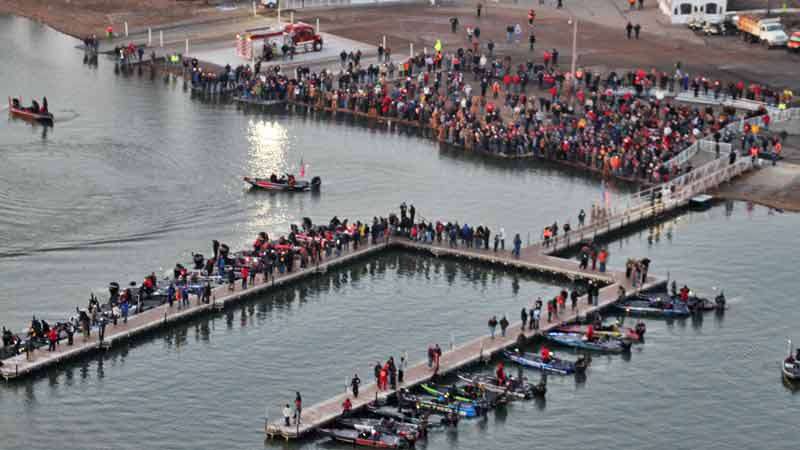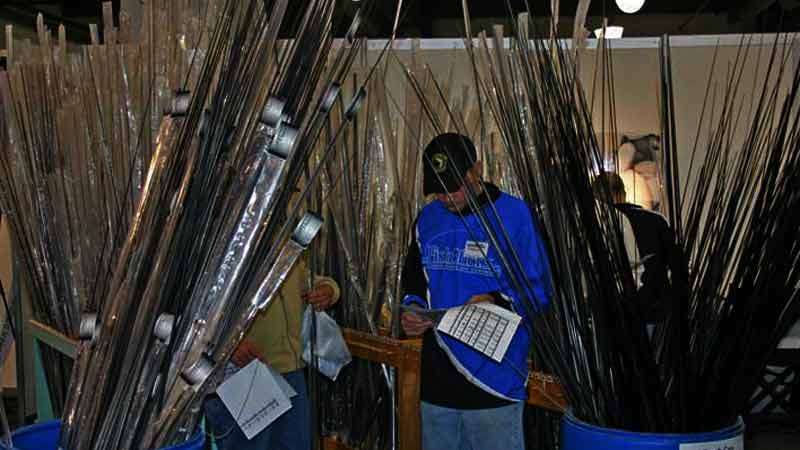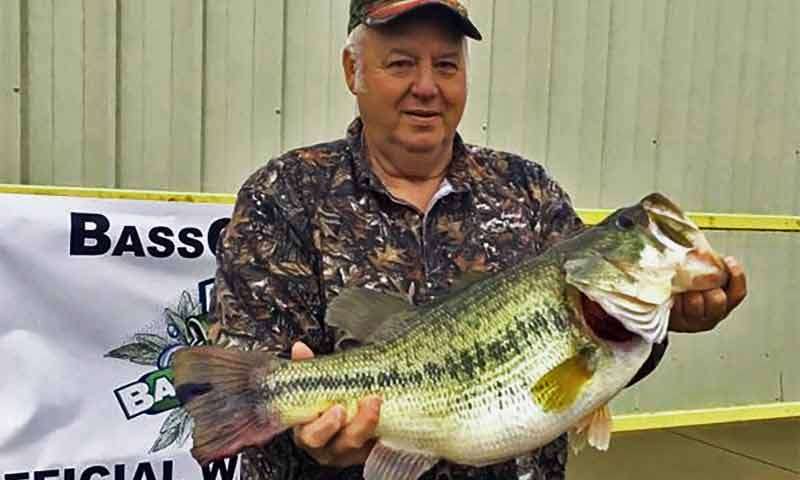
The efforts of Jerry McKinnis and Mike Mulone to create the Elite schedule was detailed last year, with the promise of exploring how booking a Bassmaster Classic requires much more consideration.
“It’s tenfold,” said Mulone, B.A.S.S. director of event and tourism partnerships, “because you add in the convention center, the needs of the arena, blocking off 4,000 hotel room nights – when I go to a city and talk about if they can host the Bassmaster Classic, I actually don’t talk to them as the fishing business.”
Mulone said the Classic incorporates a citywide convention that drives revenue and impacts a destination, much like any large convention that takes over a town. When a city takes that perspective, they’re better suited to manage and help B.A.S.S. succeed in putting on a great event, he said.
“The fishing component is very easy for us because we do that dozens of times every year and hundreds of times in our existence,” he said. “We need people who understand the city convention business and how to bring literally tens of thousands of people to their destination.
“That’s really why it’s so much more than just a fishing event. We really have a rock ‘n’ roll show, a consumer expo and citywide convention that just happens to have a fishing tournament. They have a natural resource that helps us get there, but they need so many other things. That’s the difficulty of finding Classic destinations.”
In the past 10 years, there have been five Classic host cities, with Birmingham, Ala., serving three times with two events at Lay Lake and one at Guntersville. Greenville, S.C., and Shreveport-Bossier City, La., have hosted twice, and New Orleans once.
Tulsa, Okla., will make it two in the past four years when it hosts the 2016 GEICO Bassmaster Classic presented by GoPro on March 4-6. The 2013 Classic was held in Tulsa, with fishing some 70 miles away at Grand Lake O’ The Cherokees. The weigh-ins are at the BOK Center, and the Outdoor Expo is at the Cox Business Center.
Mulone said there just isn’t a long list of cities that have all the amenities B.A.S.S. needs to put on a Classic.
“Realistically, we’re talking anywhere from 8 to 12 or 13 cities that probably could host a Classic,” he said. “We’re not competing against other fishing tournaments, we’re competing against other conventions for that space.
“In Greenville, we used 250,000 square feet of expo space. Many cities don’t even have that much. The size and scope of our event has increased since we’ve done a better job of growing the business and driving the industry. That makes it further challenging to find locations that have enough space to accommodate all our needs.”
The date of the Classic was moved back about two weeks for 2016. The first Tulsa Classic set records for low temperatures, which were broken last year on Lake Hartwell. The hope of milder weather wasn’t the main consideration, Mulone said.
“The overlying reason was to continue to grow the business,” he said. “It was a strong decision and good decision, and it has very little impact on the rest of the schedule.”
Moving it off the same traditional weekend of two other major events had been discussed for several years by B.A.S.S. officials.
The first one to avoid was the Miami Boat Show. Moving past that date would allow a number of industry partners to attend the Classic and Expo. The second was the Daytona 500, and there are a number of crossover fans who now can attend both the NASCAR race and the Classic.
“By moving into the first weekend of March, the third thing is it opens more fishing areas,” Mulone said. “There’s the potential for it to be a little warmer and have less of a chance of inclement weather. It still could happen, but the probability goes down.”
BATTLE IN THE BAYOU
Down Louisiana way, there’s a feud astrirring between landowners and anglers. Delta waterways – where B.A.S.S. has held four Classics – that have historically been open to public use are increasingly being gated off by landowners, while others have been told to leave these productive fishing waters, that they are trespassing on private property.
Andy Crawford of Louisiana Sportsmen has written a number of articles ranging in topic from “blocked canals draw ire,” “which waters are public,” and most canals are “just like your driveway.”
Legally, canals dug on private property with private funds are not publicly owned and can be blocked by law, but a former state attorney general added the state legislature could do more to claim these tidal waters for general use.
That’s where the fight should be, Bassmaster Elite Series pro Cliff Crochet said.
“I’m not mad at the landowners: They’re just doing what the law allows them to do,” said Crochet, who’s from Pierre Part and grew up fishing areas in which anglers are either blocked or are being told to leave. “You cannot attack people personally. It don’t pay to cuss people because it’s just going to make them mad. All it does is make it a hostile environment.”
Crochet and many others say their disappointment is with the state government. Baton Rouge’s Sean Robbins has been working to unite anglers, asking many to join Louisiana Sportsmen United as well as sign an online petition to show strength in numbers to the state legislators.
Crochet is in, adding that it’s not just about fishing rights; there’s also an economic affect to consider.
“A guy sitting at home is going to say, ‘Why should I get a license and buy a boat if I can’t fish?'” he said.

YES, THERE’S AN EXPO FOR THAT
If you’re anywhere near Winston Salem, N.C., on Feb 20-21, drop into the M.C. Benton Convention Center downtown – it will be the epicenter of rod building.
That’s right, the 13th annual International Rod Building Expo is coming to town and it’s being hailed as the world’s largest international consumer and trade event for the custom rod building craft and industry.
DIY rod building has grown rapidly of late, said Bob McKamey, vice president of customer relations at Mud Hole Custom Tackle. With 48,000 items offered, his company is probably the largest supplier of rod building items — they also carry parts for lure making as well as fly tying.
Mud Hole is probably the largest of the 50 exhibitors at the expo, which started around 12 years ago.
“We’ve been attending it since the very first years,” McKamey said. “We probably have the largest booth at about 60 to 80 feet long.”
Business in the industry is booming, too. McKamey said Mud Hole sends out about 400,000 catalogs each year and on average ships around 500 packages a day.
“It goes upward of 1,000 a day, depending on the weather,” he said. “If it’s snowing up north, we come in and know it’s going to be busy. A lot of guys are couped up inside and it’s a good time to build rods.”
Mud Hole has carved out a rather large niche. McKamey said the Oviedo, Fla., office has grown from 22 employees to 63 in the past 7 years. It has sponsored Elite angler Brandon Lester and has added Bradley Roy and Brett Preuett to its stable.
“We’ve got an exciting year coming up,” McKamey said.
And it all starts with the Expo, which is run by former rod builder Tom Kirkman, who now publishes RodMaker Magazine. Yeah, rod making even has magazines.
“This show is kind of like the only show in the rod building industry,” said McKamey, who added that custom innovations from the expo do make their way to commercially made products. “Innovation does happen there. Maybe even some of it was introduced at ICAST. This show draws those guys who are more in tune to custom rods, and a lot of the product is introduced to them there.”
Admission is $10. For more info, visit the official event website at www.icrbe.com.
NO HARVEST, NO FOUL
Studies have found that fishing for bedding Florida strain largemouth has little impact on populations, as long as those fish aren’t harvested.
Robert Montgomery posted the research findings of the Florida Fish and Wildlife Conservation Commission on his ActivistAngler website. The study basically says that even if a bedding fish is caught, it doesn’t have much of an affect on the spawn.
Unlike some other species, bass are considerd “batch spawners,” meaning their eggs are spread over multiple spawning events, which can be a long period in the warmer waters of Florida. (Up north, bass season is closed until after the spawn.)
Another finding of the research won’t surprise many anglers – catch rates of Florida bass on nests was lower than expected. Well, we’ll most likely see about that March 17-20 in the Bassmaster Elite at St. Johns River presented by Dick Cepek Tires & Wheels.
BEST TO NEVER WIN CLASSIC
I don’t know who would be knocked out of the “10 best who never won a Classic,” but Todd Faircloth can certainly make a case he belongs.
With his victory in the last regular Elite event of 2015, Faircloth topped $2 million in earnings and now ranks 12th on the all-time money list. The others above him on the list who haven’t won a Classic are Aaron Martens, Edwin Evers, Tommy Biffle, Gary Klein and Shaw Grigsby. Yeah, they belong.
So do Roland Martin, Bill Dance and Jimmy Houston. They are the early greats who might just stay on that list forever. I do think Faircloth is right there, oh so close. (I might be partial since I just wrote a feature on him.)
Todd and several other of his contemporaries, namely Dean Rojas and Terry Scroggins, will soon be making strong arguments to be included – unless of course they pull out a win in the next few years, which is not out of the question for any of these guys.

CULLING
- Big Bass of the Week is the kind of bass everyone dreams of. And Louis Slaughter Sr., 66, actually dreamed of catching a 12.2-pounder on Toledo Bend, but the pastor from Florien even topped his dream with this 13.15. Get the full story from Louisiana Sportsmen.
- Russ Johnson and Hunter Schrock of Itawamba Community College are certainly going to remember this week, and not just because they won the Carhartt Bassmaster College Series Southern Regional presented by Bass Pro Shops on Lake Martin. They had to overcome several issues, like locking their keys inside the truck and a wobbly trailer tire. See Bryan Brasher’s story.
- Last week, Kevin VanDam gave a rundown of rods. This week, it’s baitcast reels. The Great One discusses what he likes to do with different gear ratios, and adds you always have to be mindful of IPT. See “Know the differences in baitcast reels.”

